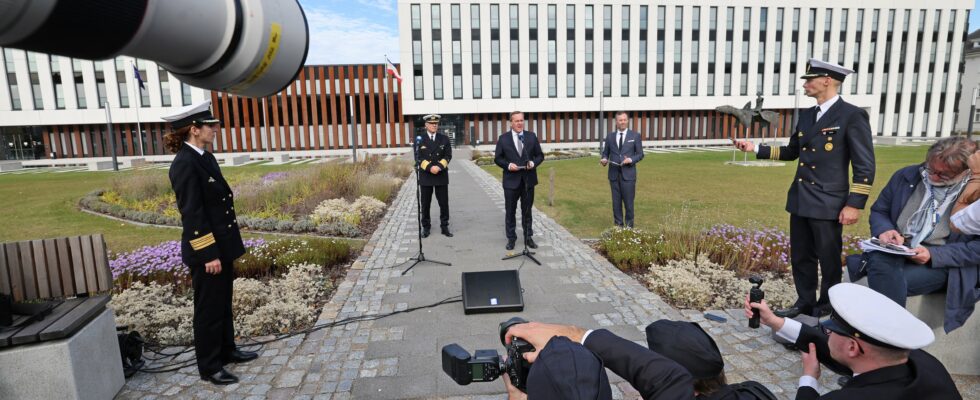Russia sees red. Moscow summoned the German ambassador this Tuesday, October 22, to protest against the opening of a new base in the Baltic Sea. “Washington, Brussels and Berlin must know that the expansion of NATO’s military infrastructure on the territory of the former GDR will have the most negative consequences and will not go unanswered,” Russian diplomacy lectured in a statement. press release.
The object of Russia’s wrath? Berlin’s inauguration on Monday of a new naval command center in the Baltic Sea, which will employ 180 people. The declared objective is to coordinate the forces of the member states in the area against Russia and to defend “the eastern flank of NATO”. This base will be located in Rostock, one of the major port cities on Germany’s northeast coast. The Baltic Command Task Force (CTF Baltic) will be led by a German admiral and composed of a staff of soldiers from 11 other countries of the Atlantic Alliance: there will be representatives from Denmark, Estonia , Finland, France, Great Britain, Italy, Latvia, Lithuania, the Netherlands, Poland and Sweden.
A “German initiative”
The center will aim to “coordinate naval activities” and give NATO “a current picture of the maritime situation” in the area, according to the German army. “The importance of the region has become even more evident in the context of the ongoing Russian aggression” in Ukraine, German Defense Minister Boris Pistorius declared on the spot. Led by Germany, which has NATO’s largest military fleet in the region, the Baltic CTF aims to defend the interests of the Alliance’s member states against “aggressive actions, particularly due to the proximity of the Russia,” he explained.
However, this new multinational structure does not come under NATO, as noted by Opex360. It is therefore not an Alliance headquarters but a naval headquarters with multinational participation. This precaution by Berlin is due to the 2 + 4 Treaty, the Moscow Treaty signed with a view to German reunification, in 1990. This fixes the international status of Germany after its reunification and prohibits the stationing and deployment of foreign troops on the territory of the former GDR.
Interviewed by public radio Deutsche WelleFrank Sauer, political scientist at the Bundeswehr University in Munich explains that “a few staff officers from NATO countries will serve there alongside the Germans” and that it “is not a question of deployment of armed forces. Carlo Masala, director of the Center for Intelligence and Security Studies at the Bundeswehr University, also tells Deutsche Welle that “the command center is a German initiative with the Baltic Sea States, which is not integrated into NATO structures and does not report to the NATO commander.”
These semantic precautions did not prevent Russia from protesting against an approach which, according to it, would violate the provisions of the Moscow Treaty. “We demanded immediate and exhaustive explanations from Berlin” on the opening of this HQ, the Russian ministry said on Tuesday. Russian diplomacy denounced an approach which “is part of the continuity of the creeping revision of the results of the Second World War and the militarization of the country”. She drew a parallel with the “remilitarization of the Rhineland by Germany in 1936”, a key episode in Nazi Germany’s march towards the Second World War, accusing the West of not having learned the lessons of history.
The Russian “hybrid threat”
Germany has regularly warned of the increased threat Russia poses to its western neighbors. A secret service official said in mid-October that Moscow would probably be capable of launching an attack against NATO by 2030. “In Germany and Europe, we see that Russian aggression manifests itself in various ways, such as as cyber and hybrid threats that continue to blur the lines between peace and war,” said Boris Pistorius.
German Foreign Minister Annalena Baerbock also reiterated her accusations of a “hybrid threat” led by Russia against Germany and neighboring countries. “We have many examples of this, time and time again,” she said Monday during a meeting in Berlin with her Nordic counterparts. Annalena Baerbock insisted on the importance of protecting the main pipelines and submarine cables in the North Sea and the Baltic Sea where ships “that should not be there” sail.
